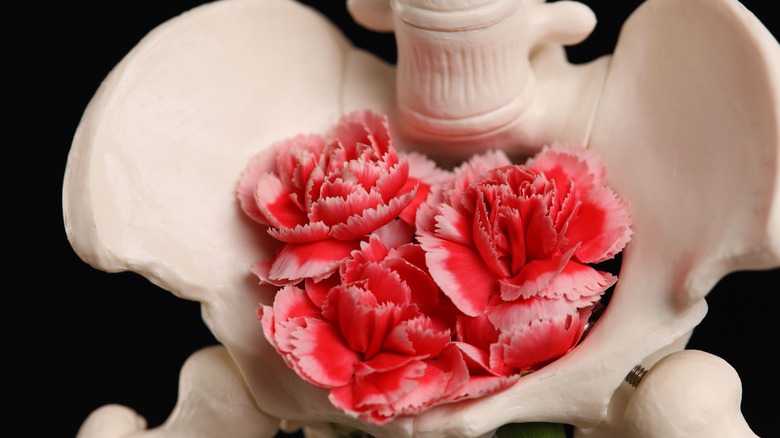What It Means When You Have Pink Vaginal Discharge
With the onset of puberty, many women find residue in their underwear. According to Medical News Today, such a discharge is normal and indicates that your vagina is healthy. Furthermore, the texture, color, and amount of vaginal discharge differ depending on your menstrual cycle and age, per Healthline. Sometimes, the appearance and color of vaginal discharge can be pink, which might be concerning, making you unsure if everything is as it should be "down there." In such cases, it helps to know what the colors mean to ensure you seek the right medical care in time.
There are different types of vaginal discharge, and their consistency and color usually categorize them. As per Healthline, white vaginal discharge is very common at the beginning and end of your menstrual cycle. Brown or bloody discharge comes immediately after your menstrual cycle, and yellow or green discharge, accompanied by an unpleasant smell, might require you to see a doctor. So what does it mean when you have pink vaginal discharge? The Cleveland Clinic reports that any discharge that changes in color, smell, or amount might indicate a problem.
Causes for pink vaginal discharge
According to Healthline, pink vaginal discharge isn't always a cause for concern — the timing of the discharge could help you better identify its underlying cause and whether or not you need to seek medical help. For example, it can appear anytime during your menstrual cycle due to a hormonal imbalance caused by low estrogen levels, says the source. The female reproductive system uses the hormone estrogen to stabilize the uterine lining. Without estrogen, this lining is more likely to break down and shed irregularly, causing you to experience spotting in a range of colors, per Healthline.
According to Medical News Today, pink vaginal discharge usually contains little blood and sometimes indicates spotting before a period. However, pink discharge is also a sign of implantation bleeding, which is most common in early pregnancy, says the source. In addition, vaginal discharge can be pink after sexual intercourse. In such situations, the pink hue is caused by tears or irritations in the cervix or vagina (via Medical News Today).
An ovarian cyst can also cause a pink discharge. WebMD defines ovarian cysts as fluid-filled sacks or pockets that develop on one of the ovaries. According to Healthline, there are different types of ovarian cysts — some appear as a part of the menstrual cycle. Other types of cysts that aren't a part of the menstrual cycle include dermoid cysts or cystadenomas, which tend to grow large and cause spotting or pink discharge.
When to see a doctor for pink vaginal discharge
According to Medical News Today, the best time to see a doctor is when your vaginal discharge has an unusual appearance or smell. In addition, medical care might be needed if you experience pain, discomfort, itching, a strong odor, regular spotting after sex, and a burning sensation during urination. According to Healthline, any form of spotting or bleeding that goes outside the normal menstrual cycle timeframe, accompanied by symptoms such as fever, pain, or dizziness, is enough reason for you to see a doctor.
If you're pregnant and experience any form of bleeding, talk to your doctor about it. Suppose this bleeding comes with pain, dizziness, tissue, or clotting. In that case, it might indicate an ectopic pregnancy or early miscarriage, and in such instances, you should seek medical assistance immediately, according to Healthline. It's also important to seek medical attention if you experience pink discharge after menopause. According to Healthline, irregular discharge after menopause could signify fibroids or cervical cancer and other conditions that need immediate medical attention.
Discharges are normal, therefore, it's best to avoid applying sprays, perfumes, or douches to your vagina — whether you want to rid your vagina of discharge or change the smell, according to the Cleveland Clinic. An examination by your doctor or gynecologist is the best way to remedy the problem and ensure your vaginal hygiene is at its best. During the diagnosis, your doctor might take a sample of your discharge for testing and perform a pelvic exam.



